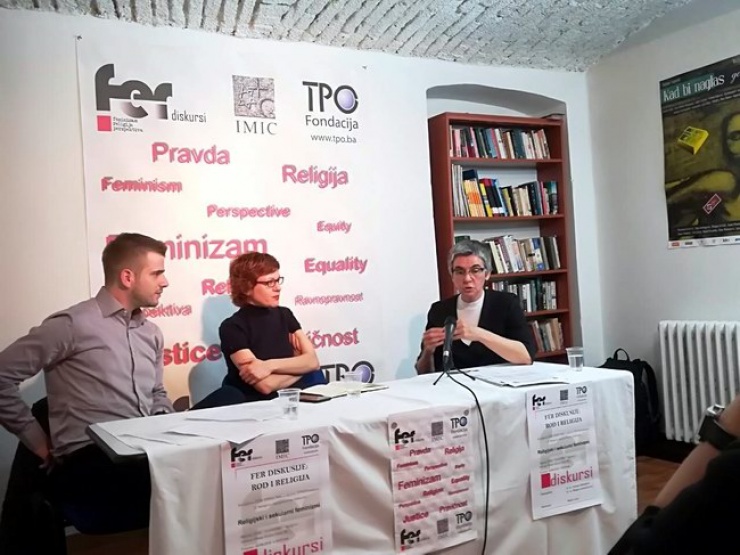The struggle for abolishment of oppression and structural violence represents the common ground for social engagement of all feminisms, both secular and religious ones – this was emphasized by Adriana Zaharijević and Rebeka Jadranka Anić, panelists at the second session of FER Discourses which was held by TPO Foundation and IMIC Zajedno on April 20, 2018.
During the second panel discussion of FER Discourses, the main theme was the necessity to analyze the issue of gender ideology more thoroughly, because it is often subjected to manipulation in the process of counter-narratives creation against feminisms and gender equality. Religion is one of the important social phenomena in many societies and it greatly affects political situations in those societies. Politics – especially, conservative politics – is a central issue in understanding the position of women in the world as well as gender. Neoliberal capitalism, different types of sovereign states, and tendencies to see the world in unipolar way are the factors, which additionally affect the manipulation with the term gender and gender ideology. Zaharijević explained how gender ideology is identified with communism, individualism, neoliberalism, and globalization – basically, by all modern world phenomena. In her presentation of secular and religious feminisms' relationship, Anić highlighted the need for a new perspective which would not strictly divide the secular and religious sphere of lives considering that some individuals live both of these realities. Women of faith were part of the emancipation projects from the very beginning, and their motivation came from their religion. On the basis of sacred texts, they defended their rights and their involvement in the processes of decision-making. Questioning the attitudes on women, Anić pointed out that it is important to take into account the fact that men wrote the religious literature. Religious literature was often under the influence of cultures and intellectual traditions with which the newly born religions often met as well as the influences of the ancient philosophy, Aristotle, in particular.
Originally, there are no arguments in the sacred texts for othering and oppression of women and binary divisions. One of the topics of the panel discussion was also the ratification of the Istanbul Convention in Croatia. The lecturers disclosed that Croatia shows great interest for this topic because of the influence of the Church and some NGOs close to the Church. These NGOs operate as an extension of the Church but with non-religious agenda, which is a cover for imposing one religious worldview on everyone in a secular state. There was no great interest in BiH and Serbia for these topics; therefore the Istanbul Convention was adopted without any discussion or resistance. However, both panelists stated that the region should prepare for possible reflections of the Croatian campaign within other countries. Sometimes, we have the impression that there is a lack of will for a dialogue between secular and religious feminism, but it is exactly the reason why we need insist on dialogue between the two, ask some questions and create connections. Whether a person's motivation for action is religious or not is less important than the fact that the goal of both secular and religious feminism is the same: equality of women and men. Changing the narrative and the ways of thinking take time and it cannot be accelerated with mere adoption of the legal framework. The conclusion of the second panel discussion on religious and secular feminisms was that it is important to learn from similar contexts on gender equality and recognize problems as they appear, so that women would not constantly be in a defensive and reactionary position but rather act proactively.





